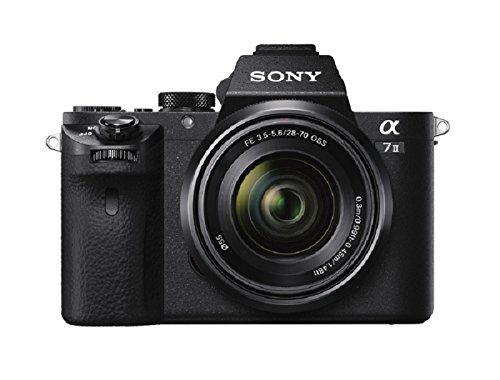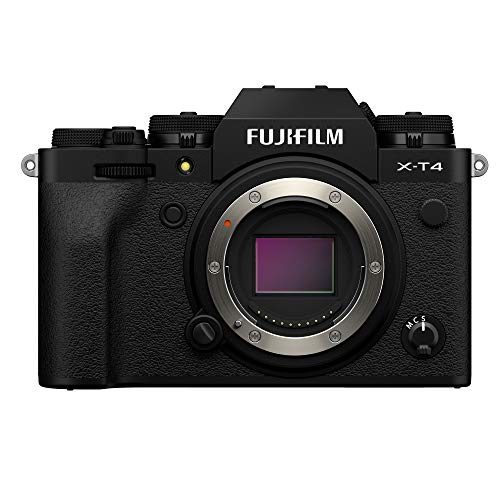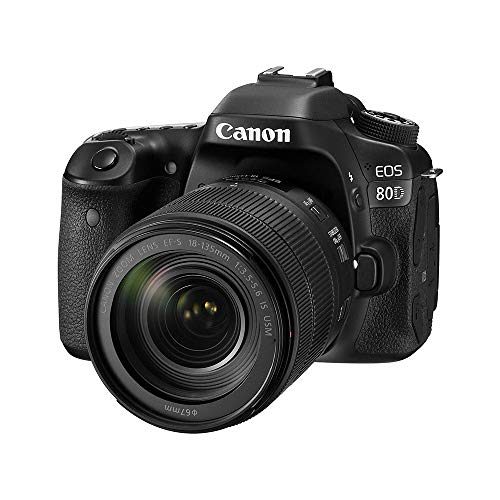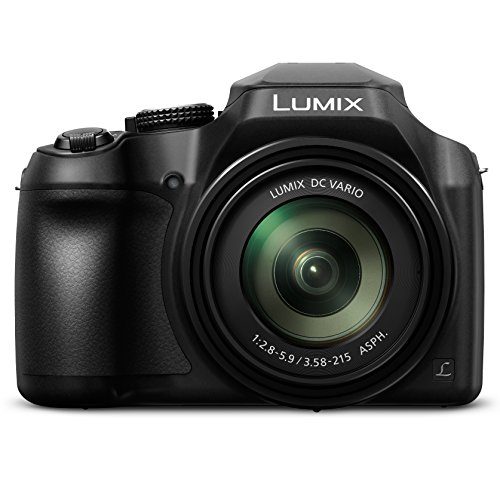Looking for the best camera for interviews? In this post, we’ll talk you through the top choices to consider from dedicated video cameras and DSLR/mirrorless cameras. You’ll find the best camera for your next interview in no time!
Surprisingly, one thing that novice interviewers forget when starting out is how important it is to get a decent camera for their interviews.
It’s so easy to get caught up in the questions you’re going to ask and how you’re going to steer the conversation, that finding a decent camera can be pushed to the back of your mind.
Unfortunately, the best interview in the world will be a let-down if you can’t hear the answers given or see the person being interviewed. Finding a camera that will serve you well is an important first step in becoming a good interviewer.
This post will list some of the best cameras for interviews. We’ll discuss a range of options from the budget all the way up to the luxury ticket items. We’ll also run through some important factors to think about when preparing your interview setup.
Read on to make sure your gear is interview-ready.
| IMAGE | PRODUCT | DETAILS | |
|---|---|---|---|
 |
Our Top PickOur Top PickSony Alpha a7 Mirrorless Camera |
|
VIEW ON AMAZON → |
 |
Fujifilm X-T4 |
|
VIEW ON AMAZON → |
 |
Canon EOS 90D |
|
VIEW ON AMAZON → |
Best Camera for Interviews: Our Favorite Picks
If we were to switch careers and become interviewers, these are the cameras we’d use.
1. Sony Alpha a7 Mirrorless Camera
This is one of Sony’s many mirrorless cameras that come with high-quality video capabilities. The hybrid autofocus system and stellar image stabilization features make his one of the best video tools for interviewers. It’s easy to use and the lightweight build makes it super-easy to take with you.
The full-frame lens on the A7 gives you plenty of crop-free space to work with. A great interview video is stable and consistent. Sony has built a fantastic reputation for producing products that deliver excellent video quality every time.
Your interviews will be stable, crisp and hassle-free. It’s not the cheapest option out there, but it’s a strong contender as the best camera for interviews.
It’s not a dedicated video camera since it’s actually a mirrorless camera, but it delivers really fantastic video quality.
You can also hook this camera up to you computer and use it for Zoom interviews.
Pros:
- Great video and audio quality
- Compact and easy to use
- Compatible with E & A mount lenses
- Full-frame CMOS image sensor
Cons:
- The low-light performance could be better
2. ORDRO 4K Video Camera
This is a fantastic 4k video camera that delivers professional-grade, high-quality films. The onboard image processing on this offering from ORDRO blasts through your shots quickly and efficiently. Interviewers need to move quickly and deliver work with a high level of consistency.
The simple UI, handy touchscreen LCD and brilliant image quality all go a long way to make your interviewing tasks easier. Further bumps to productivity come in the form of a bonus IR remote and extra battery.
The stereo microphone on this model adds a welcome boost to audio quality to keep your interviews crisp and clear. It’s possible to use this 4k video camera while charging, making it an excellent choice for those long days with endless interviews.
Pros:
- Packed with productivity-focused extras
- One of our favorite video cameras
- Included stereo microphone
Cons:
3. Fujifilm X-T4 Mirrorless Camera
The stunning video performance on the X-T4 makes it one of the best cameras for interviews. The in-body (as opposed to digital) image stabilization keeps your videos steady and stable throughout. Video cameras are worthless if their videos are shaking all over the place.
The X-T4 sports an APS-C CMOS sensor and a powerful image processor engine that delivers really good quality.
Fujifilm has updated the face tracking and autofocus software on the X-T4 to keep your interviewee sharply in focus for every second of your video. We recommend picking up the optional vertical battery grip for this model. It adds two extra batteries for a much-needed boost to battery life.
With or without the grip, the enhanced battery performance on the X-T4 holds up quite well to scrutiny. If you can afford to invest in a more premium camera, this Fujifilm will prove a fantastic addition to your interview arsenal.
Pros:
- Some of the best video face tracking we’ve seen
- Optional battery boost from the extra grip
- Also produces stunning stills
- Built-in Wi Fi
Cons:
- You’ll need to attach an external microphone to guarantee good audio recording
4. Sony CX405: best cheap camera for interviews
If this article was titled “best camera for interviews – budget edition”, the CX405 would at the top of our list. If you need an interview camera that can get the job done without breaking the bank, this is a video camera that’s well worth considering.
While the audio recording isn’t ground-breaking, you’ll have plenty of money left over for external microphones, which are virtually a must-have anyway! Sony’s “steadyshot” and “BIONZ X image processing engine” work in tandem to produce some pretty impressive video considering the price.
There’s a suite of nifty software features that make this an attractive product for those who want to shoot interviews effectively. The dual shooting mode lets users record videos in two formats simultaneously, boosting flexibility in post production.
The face detection, intelligent auto and anti-motion blur make this an excellent budget interview camera. Just make sure you consider an external microphone for consistent audio quality.
Pros:
- Great price
- Surprisingly good image quality
- Dual recording mode
Cons:
- The microphone isn’t very impressive
5. Canon Powershot G7 X Mark III
This option from Canon is geared towards video content creators. For our money, it’s their best video camera in this category. The design is built from the ground up to produce excellent video with an easy-to-use control system.
Expect fantastic 4K videos, brilliant audio flexibility thanks to the 3.5mm mic input and buttery-smooth recordings at 120 frames per second. Canon has been putting a lot of thought into their video cameras in recent years and this really shows on the G7 X Mark III.
The Wi-Fi and Bluetooth connectivity features make it refreshingly easy to share your interviews on social media. If you’re streaming an interview live, it’s possible to stream live to your YouTube channel if you login with your details.
Canon produces a modest range of external microphones that are compatible with this camera right out of the box. The low-light performance of the Mark III is very strong; your interviews will still look great even if your setup isn’t perfect.
Pros:
- Excellent live-streaming and sharing options
- 120 frames per second video
- One of Canon’s most well-thought-out video cameras
Cons:
- Quite pricey for a compact
- The autofocus is disappointing compared to Canon’s other cameras
6. Canon EOS 90D
If you need a camera that’s good for both interviews and still images, the Canon EOS 90D is a great choice. Canon promises “professional quality sound” for filmmakers. Canon sells a range of lenses that are well-suited to video recording.
The APS-C CMOS image sensor does a great job of capturing light and the Canon EOS 90D delivers superb video quality.
The flexibility of a DSLR like this means you can tweak your setup to your heart’s content to get your interviews just right. The manual controls on the EOS 90D allow you to fine tune your interviews in great detail.
Your options for frame rate and codec are reasonably varied on this model, giving you plenty of flexibility for how you film your interviews. Videos can be recorded in either MP4 or MOV formats.
Canon’s fantastic utility software allows users to connect a PC to their camera from anywhere for speedy file transfers and post production tasks.
Pros:
- Good audio out of the box
- Granular manual controls
- Canon’s utility software comes in handy
Cons:
7. Panasonic Lumix FZ80
This is a compact, no-nonsense camera that produces great video at up to 30 frames per second. The Panasonic Lumix line is a step above “bargain basement” while still maintaining an affordable price point.
If you’re looking for a camera for interviews that will not burn a hole in your pockets, this is a great option. Cameras for interviews should make it easy for you to keep on eye on your setup and video results. This Panasonic camera does exactly that.
The viewfinder of the FZ80 is surprisingly high-resolution at 1170k dots, meaning you’ll always have a crystal clear view of the subjects in your interviews. The built-in Wi-Fi feature and “travel ready” design considerations on this camera make it a great choice for the busy interviewer.
Pros:
- An affordable video camera
- Full HD at 30 fps
- Decent dynamic range
Cons:
- Doesn’t do too well in low-light scenarios
8. Canon Vixia HF R800 Video Camera
This is another strong contender for “best camera for interviews”. The color reproduction, optical image stabilization, x57 zoom lens and ergonomic design make this an excellent camera for an intermediate or beginner interviewer.
The controls, settings UI and overall design on this camera are laughably simple to get to grips with. It shouldn’t be a challenge to get started, even if you’re a complete novice. The HF R800 plays nicely with virtually any external mic that uses a standard input.
Flexibility for accessories like tripods is also well thought out here. Overall, this is one of our favorite cameras for interviews.
Pros:
- x57 zoom lens
- Audio input for externals mics
- Fantastic color reproduction
Cons:
- If you like strong manual controls, this camera isn’t for you
9. Sony Alpha A6000 Mirrorless Camera
The APS-C, CMOS sensor on this mirrorless camera from Sony produces stunning image quality for a reasonable price. A number of factors make this a great camera to consider for recording interviews.
Sony has crammed plenty of choice into the video and audio recording controls on the A6000. A wide variety of frame rates, codecs and audio options are available. This should give you plenty of versatility when working in a variety of different interviewing scenarios.
The button layout is refreshingly intuitive on this model; it won’t take you long at all to get up to speed. Chances are, you’ll also want to occasionally take photos with your new piece of kit.
Fortunately, the A6000 is a phenomenal still-image camera that’s capable of taking beautiful photos with minimal effort.
The excellent performance from the A6000 makes it a top candidate as one of the best cameras for interviews.
Pros:
- A fantastic “all-rounder” camera
- From Sony’s brilliant line of mirrorless cameras
- Reasonably priced considering the feature set
Cons:
10. Olympus OM-D E-M1 Mark II
The 20.4 megapixel live MOS sensor on this mirrorless camera packs more than enough punch for even the most demanding interview environment. This Olympus camera comes with an auto focus system that frankly embarrasses a huge proportion of the competition.
121 cross-type auto focus points lock onto your subject and keep them crystal clear for every second of your video. This is particularly useful if you’re interviewing someone who gesticulates or moves around a lot when they’re talking.
The quad-core image processor on this camera does a phenomenal job of producing picture-perfect results time after time. A camera like this doesn’t come cheap, but it’s worth it in our opinion. Videos are recorded in full HD and have impressive levels of color accuracy and resolution.
Pros:
- Fantastic onboard image processing
- High-end focus and shooting features
- Compact form factor
Cons:
- High-end features come with a higher price
Preparing Your Interview Setup
The best video camera in the world will still let you down if you haven’t put any thought into your setup. A huge component of successful video recording is being prepared. Your main questions should be:
- Is my subject (interviewee) comfortably in frame and in focus?
- Can the questions and answers in my video be heard clearly?
- Have I kept distractions to a minimum?
These questions are designed to get you thinking about what you’ll need to get right if your camera is going to produce good results for you.
Tripod
Even the most premium camera will benefit from a tripod, or at least a level surface, in an interview scenario. The vast majority of interviews take place in a static, seated location. For this reason, you don’t need the flexibility that comes with holding your camera in your hand.
Double-check the compatibility of any camera you’re considering. You might need a hot shoe mount to get your tripod to fit. A stable camera is an effective interview camera.
External Microphone
An external microphone is a must-hav. Even some of the best cameras for interviews will need some extra support when it comes to audio recording. If you’re planning on making a career out of conducting interviews, then an external microphone is a must.
Check out some of the best boom mics here.
The main content of any interview is the words that are being exchanged. For this reason, getting your audio crisp and clear should be your top priority. Ask yourself if a microphone attached to your camera will be enough.
It might be worth using a dedicated mic that your interviewee wears instead.
Lighting
Some interview cameras offer good low light results, but in general you’ll need to light your room or environment effectively. Consider the shadows your lighting setup is likely to cast and adapt to make sure everything is perfect. A dimly-lit room isn’t conducive to a killer interview!
Consider the standard three-point lighting setup and see how you can tweak your environment to get the perfect video.
Here are some of the best interview lighting kits.
Final Thoughts
The best interview camera is the one that meets your needs. It’s great to have ambitions, but you should buy the equipment that best fits your current situation. It’s no good spending over a grand on a new piece of kit if you’re just starting out.; interview filming is a relatively simple process.
It’s a static shooting environment with minimal changes. Your main concerns should be audio results and decent lighting. A budget camera can do very well in this scenario.
That being said, you want to make sure you’re buying a camera that has the potential to grow with you. If you think your career in interviewing has legs, a hyper-budget camera will show its price pretty quickly. A camera with an interchangeable lens system is a great way to go in our opinion.
The ability to switch lenses and update your kit with them further down the line breathes a whole lot of versatility into your approach. In this case, we recommend picking up one of the mirrorless or DSLR cameras from the list above and buying more premium lenses as and when you need them.
If your interviewing is more of a one-off or every-now-and-then scenario, the budget options from this page will serve you very well.
Whichever camera you choose, we hope you have fun using it!


